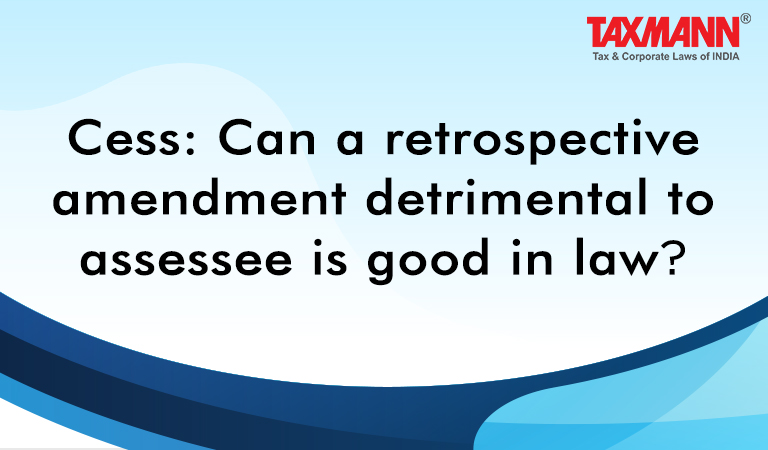Cess: Can a retrospective amendment be detrimental to assessee is good in law?
- Blog|News|Income Tax|
- < 1 minute
- By Taxmann
- |
- Last Updated on 10 February, 2022

Rajat Jain – [2022] 135 taxmann.com 124 (Article)
The Hon’ble Finance Minister, in the Budget 2022-23 speech, clarified the legal position with respect to the treatment of cess and surcharge in computation of income chargeable to tax under the head “Profits and Gains of Business or Profession” and proposed to amend Section 40(a)(ii) of the Income Tax Act, 1961 (‘Act’) by way of insertion of an Explanation to the effect that the term ‘tax’ used therein shall also include ‘any surcharge or cess, by whatever name called, on such tax’.
The amendment seeks to nullify the impact of the judgements passed by the Hon’ble Bombay High Court in the case of Sesa Goa Ltd. v. Jt. CIT [2020] 117 taxmann.com 96 and the Hon’ble Rajasthan High Court in the case of Chambal Fertilizers & Chemicals Ltd v. Jt.CIT [2019] 107 taxmann.com 484, which have been followed by several Tribunals, wherein the Hon’ble Courts had opined that cess is not ‘tax’ and hence is not disallowable under section 40(a)(ii) of the Act.
It may be noted that such amendment is proposed to be brought in retrospectively from 01.04.2005 i.e., for AY 2005-06 and subsequent years.
Click Here To Read the Full Article
Disclaimer: The content/information published on the website is only for general information of the user and shall not be construed as legal advice. While the Taxmann has exercised reasonable efforts to ensure the veracity of information/content published, Taxmann shall be under no liability in any manner whatsoever for incorrect information, if any.

Taxmann Publications has a dedicated in-house Research & Editorial Team. This team consists of a team of Chartered Accountants, Company Secretaries, and Lawyers. This team works under the guidance and supervision of editor-in-chief Mr Rakesh Bhargava.
The Research and Editorial Team is responsible for developing reliable and accurate content for the readers. The team follows the six-sigma approach to achieve the benchmark of zero error in its publications and research platforms. The team ensures that the following publication guidelines are thoroughly followed while developing the content:
- The statutory material is obtained only from the authorized and reliable sources
- All the latest developments in the judicial and legislative fields are covered
- Prepare the analytical write-ups on current, controversial, and important issues to help the readers to understand the concept and its implications
- Every content published by Taxmann is complete, accurate and lucid
- All evidence-based statements are supported with proper reference to Section, Circular No., Notification No. or citations
- The golden rules of grammar, style and consistency are thoroughly followed
- Font and size that’s easy to read and remain consistent across all imprint and digital publications are applied



 CA | CS | CMA
CA | CS | CMA
